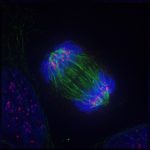Definition
noun
(cell biology) The sequence of growth and division of a cell, and consists of a series of biological processes, particularly the resting phase (G0), the interphase (G1, S, G2), and cell division (i.e. mitosis and cytokinesis)
Supplement
Cell cycle pertains to the sequence of growth and division of a cell. In essence, the cell cycle involves the duplication of DNA via DNA replication and this leads to the division of the parent cell, yielding two daughter cells. These processes are essential for cell growth, replication, and division.
In eukaryotes, the cell cycle is comprised of a series of biological events namely the resting phase, the interphase, the cell division (i.e. mitotic phase and cytokinesis). During the resting phase, the cell is in an inactive, non-cycling state. Interphase is that phase of the cell cycle where the cell next grows in size, its DNA replicated, and makes a copy of the cell’s DNA to prepare for the next cell division. The interphase is comprised of three stages: G1, S phase, and G2. The final stage is cell division. It includes the mitotic phase (mitosis) and cytokinesis. In mitotic phase, the cell undergoes four stages of mitosis: prophase, metaphase, anaphase, and telophase. Following telophase is cytokinesis, which is the division of the cytoplasm and the plasma membrane resulting into two cells, each having its own nucleus and cytoplasm surrounded by a plasma membrane. The end result is two daughter cells that are genetically identical and in which would enter the first phase of the cell cycle.
Synonym(s):
- cell-division cycle
See also:
- mitosis
- interphase
- cytokinesis
Related term(s):
- Cell division cycle gene
- Cell division cycle mutant








